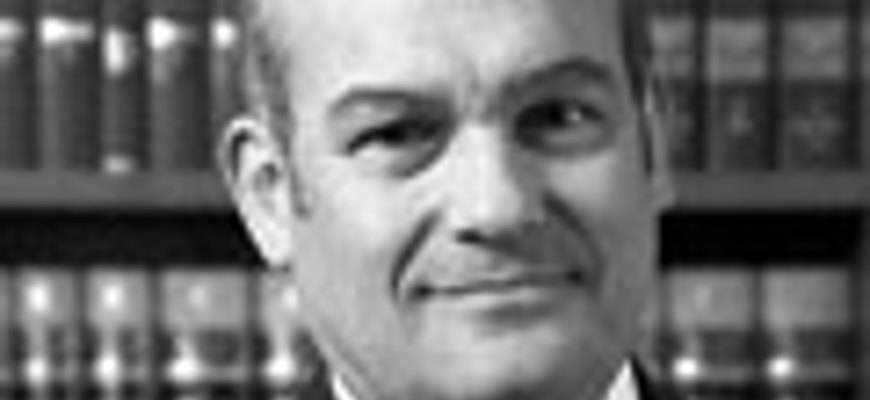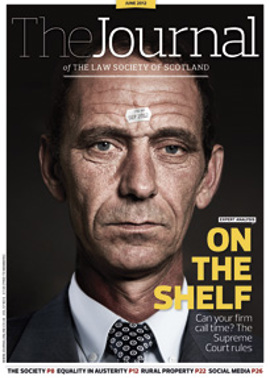President's column

It is an odd feeling being responsible for 10,000+ lawyers, and by extension many more people in the way of support staff, families, and even I guess clients. It is of course a great honour for me to be representing and leading this great profession, and I am already feeling the weight on my shoulders. No one has yet audibly tutted or visibly rolled any eyes. However, such is the goldfishiness of the bowl in our IT age, if I mix metaphors and flap my wings in the forest it doesn’t take long for the tsunami to hit the faraway shore.
I recently likened the Law Society of Scotland to a backbone in the body of the legal profession. Like all analogies it is probably limited, but it is a working model. My job is to try to give stability for the free movement of the various limbs. In my beloved sport of karate, we use and are aware of counterbalance and action/reaction – you can’t use an arm without something to push against, and the backbone is an essential fulcrum. In professional terms, the Society provides a starting-off point and a reckoner by which members’ actions can be measured. But where and how they wave and walk is up to them.
Every recent President has lived in times that are interesting, by the Confucian measure. I am aware of some of the challenges I face in 2012-13, and no doubt something new and unexpected will come up. I often say to non-solicitors that whatever the pressures, stresses and worries of being a solicitor, it is never boring, as no two days are the same and there is always something you have not seen before. As President, I suspect that this may turn out a burden rather than a pleasure – or at least a risk.
Debating the dual role
Specifics: the representation versus regulation issue looks to be shaping up as a bit of bad weather for those who like things as they are. Not only has John McGovern learnedly articulated the general question of how the two sit together, he has given in these pages [May, p16] in effect an eminent professional opinion on the impact of the European Convention on Human Rights and the potential for challenge in the European Court on the very existence and raison d’être of the Society and its underpinning legislation.
And in my office mail (I mean at Austin Lafferty Solicitors, not Drumsheugh) last week I got a letter from a solicitor – one not at all involved in the larger political matters of the profession – wishing me well and mentioning, almost in passing, the assumption that the two duties are almost certainly in conflict.
In other words, this topic, which had been floating about and was a trouble mainly to those concerned about the regulation role, is now coalescing into an issue with legs of its own (threatening to detach and run away from the backbone), with concerns expressed equally on the representation side – indeed that is John’s prime issue.
So how will this play out – especially on my watch? I anticipate some sophisticated thinking and debating in print, over time a refining of the issues, and of course consideration at the Society’s parliament – the Council. It is for Council members on behalf of and with input from their constituents to work out and decide how the Society moves forward. Given the length of time the new constitution process has taken (so far), it is unlikely that I will be asked to turn the lights off at Drumsheugh Gardens on my way out.
In my inaugural President’s page I want to emphasise the bond we all have with each other. I will not criticise any point of view – most, if not all, are legitimate or at least deserve a hearing, and if there is one thing we are trained to do as solicitors, it is to argue dispassionately and even amicably with a view to establishing something definite. An outcome. And to get to a robust outcome we need to have looked at every angle, teased out every nuance. I will tell you that I believe the Law Society of Scotland is innocent until proven guilty.
I believe and have reason to believe that the Society is a high-performing institution that brings benefit to those it serves, and it would take an awful lot to convince me that it was fundamentally not fit for its dual purpose.
I am keen not just on principle, but pragmatism. The Society is never just a passive receptacle or vehicle; it has been and will be an organic, active, innovative organisation that makes a difference.
To break it up and replace it with smaller, more specialised, perhaps more localised bodies of solicitors seems counter-intuitive, even counter-productive. OK, the Law Society of Scotland is not perfect. What is or would be? Certainly none of the likely alternatives.
But of course I may be wrong. Let’s have the debate. I am off and running.
In this issue
- Prescription and title to moveable property
- Gold-plated pension liabilities – what next for law firms?
- Getting your fix
- A trainee perspective on business development
- Embedding ADR in the civil justice system
- From death to life
- Reading for pleasure
- Appreciation: Alistair Hamilton
- Who shares in the common grazings?
- Opinion column: Mev Brown
- Book reviews
- Council profile
- Why the dual role works
- Rights both ways: a contrary view
- President's column
- Property reports relaunched
- Equality in austerity
- How old is too old?
- Expanding the country file
- The social side of practice
- Judicial minefield
- Program protection
- Life bans just not sporting
- Coleman revisited
- Never mind the reasons
- Another year in focus
- Law reform roundup
- Business checklist
- Banks: POA campaign continues
- Ask the experts
- Ask Ash






